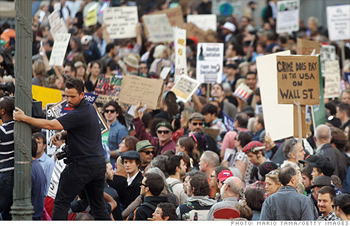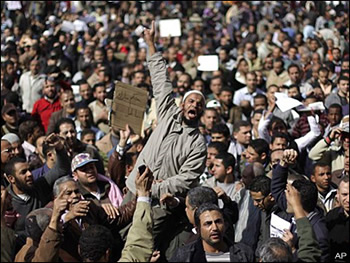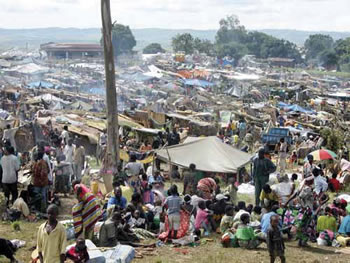Advent Agitations:
"How Then Can We Be Saved?"
For Sunday November 27, 2011
First Sunday in Advent
Lectionary Readings (Revised Common Lectionary, Year B)
Isaiah 64:1–9
Psalm 80:1–7, 17–19
1 Corinthians 1:3–9
Mark 13:24–37
This week Americans will celebrate Thanksgiving, although many ordinary people who are just trying to make a life are finding it harder and harder to give thanks. The protests on Wall Street reveal how many people on Main Street consider themselves part of a permanent underclass trapped by economic and political forces beyond their control.
"Hear us, O Shepherd of Israel. Shine forth. Awaken your might; come and save us."
 |
Occupy Wall Street. |
"Occupy Wall Street" has cast a harsh light on economic disparities in the United States. The grievances go further to include our grossly dysfunctional government, partisan politics, environmental degradation and declining educational standards. Banks received billions in bailouts to privatize their profits and socialize their risks. We've spent trillions for ten years of wars in Afghanistan and Iraq, and paid for them with a government credit card. People of power and privilege then suggest that we balance our budgets by eliminating what they call "entitlements" for ordinary workers.
"Restore us, O God, make your face shine upon us."
While Americans celebrate Thanksgiving this week, Christians around the world begin a new liturgical year with the first Sunday in Advent. And since Christians are radical egalitarians who believe that God loves every nation as much as their own, we need to widen our lens to include our whole human family.
"Oh, look upon us, we pray, for we are all your people."
 |
Cairo demonstrations. |
Michael Lewis calls himself a "disaster tourist" in his book Boomerang (2011) about the debt crises in Iceland, Greece, Ireland and Germany. The "Arab Spring" overthrew dictators in Tunisia, Egypt and Libya, but also unleashed unknown forces that would fill the political vacuums created in a dozen countries. These countries face uncertain times for many years.
"Return to us, God Almighty! Look down from heaven and see!"
In a category by itself is Africa. It takes a great leap of moral imagination to comprehend the devastation in countries like Zimbabwe, Liberia, Somalia, Sudan's Darfur, and especially the Congo. A 2008 study by the International Rescue Committee concluded that 5.4 million "excess deaths" occurred in the Congo from 1998 to 2007 — a staggering ten percent of the population and a death toll eight times greater than the Rwandan genocide. Millions more have been displaced.
"Oh, that you would rend the heavens and come down!"
If it seems strange to begin the Advent season with such a litany of woes, take a closer look at the readings for this week with their bitter refrains. The psalmist Asaph complains that his people have eaten "the bread of tears" and drunk "tears by the bowlful." They are the object of mockery and scorn among their neighbors. The walls of their vineyards have crumbled, and wild boars ravage among the ruins.
The prophet Isaiah laments how Israel's "holy and glorious temple" has been burned to the ground. Deportation of the people by Assyrian conquerors has emptied their "sacred cities" so that they resemble barren deserts. "All that we treasured lies in ruins," he cries. God seems to have hidden his face. He no longer speaks or acts. His people are driven like shriveled leaves in a wild wind, and so he wonders: "How then can we be saved?" (Isaiah 64:5).
 |
Congo refugees. |
I'm grateful for the brutal realism of Asaph and Isaiah. They're so much more authentic than a Hallmark Christmas card. They warn me not to sentimentalize Christmas. They remind me that Advent is about watching and waiting. We watch and wait, each in our own deeply personal way, for God to "come down" and do something about our unsolved problems, our unanswered prayers, and so many unfulfilled promises. Following the psalmist and the prophet, we rightly beg God to restore, revive, and rescue us. In the words of the Christmas hymn, Advent isn't about pious platitudes but about our very real "hopes and fears of all the years."
Of course, the Christmas story insists that God has done something, only in ways that we didn't expect. The sacred baby Jesus entered into our secular world, the eternal into the temporal, the heavenly into the mundane. The British writer GK Chesterton (1874–1936) captures this divine descent in his poem "The House of Christmas," and even suggests that God himself was homeless.
There fared a mother driven forth
Out of an inn to roam;
In the place where she was homeless
All men are at home.
The crazy stable close at hand,
With shaking timber and shifting sand,
Grew a stronger thing to abide and stand
Than the square stones of Rome.For men are homesick in their homes,
And strangers under the sun,
And they lay on their heads in a foreign land
Whenever the day is done.
Here we have battle and blazing eyes,
And chance and honour and high surprise,
But our homes are under miraculous skies
Where the yule tale was begun.A Child in a foul stable,
Where the beasts feed and foam;
Only where He was homeless
Are you and I at home;
We have hands that fashion and heads that know,
But our hearts we lost — how long ago!
In a place no chart nor ship can show
Under the sky's dome.This world is wild as an old wives' tale,
And strange the plain things are,
The earth is enough and the air is enough
For our wonder and our war;
But our rest is as far as the fire-drake swings
And our peace is put in impossible things
Where clashed and thundered unthinkable wings
Round an incredible star.To an open house in the evening
Home shall men come,
To an older place than Eden
And a taller town than Rome.
To the end of the way of the wandering star,
To the things that cannot be and that are,
To the place where God was homeless
And all men are at home.
A foul stable with filthy animals, a pregnant and homeless teenager, our wild world. It's in God's own homelessness, says Chesterton, that we discover our own sense of home. And so, following the words of our Lord from this week's gospel, we "keep watch" (Mark 13:35).
Image credits: (1) Inquistr.com; (2) KATU.com; and (3) VergeMagazine.com.





